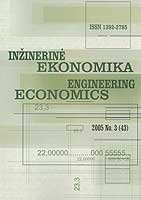Applying the Principles of Organisational Intelligence in University Strategies
Applying the Principles of Organisational Intelligence in University Strategies
Author(s): Bronius Neverauskas, Rūta Čiutienė, Inga StaškevičiūtėSubject(s): Economy
Published by: Kauno Technologijos Universitetas
Keywords: organizational intelligence; university; learning organization; decision-making; leadership.
Summary/Abstract: This article describes the concept of organizational intelligence and its use in higher education system. The examples of the world experience show, that for a long time universities, despite their origin country, were the factor that changed environment, however, globalization changed this process to universities’ disadvantage: there were some new processes going on in the environment, which directly were not reflected in the activity of univer-sities and as a result of this universities gradually turned into isolated systems possessing little connection with the surrounding environment. The state, trying to bring the universities nearer to the requirements of society and market, is changing the manner of financing and, thus, initiating the universities to find their own space within the market. Today this process requires the organization that re-spects the new management paradigms of community, networks, feedback, self-organization, and learning or-ganizations despite the form of organization (business or public sector organization). Organizations mired in bu-reaucracy are slow to respond to environmental changes, so organizations must grow far more intelligence to deal with the diverse and simultaneous challenges encoun-tered on a daily basis. The breadth of the gap between what is – and what needs to be – is so great that many leaders conclude their organizations lack the collective intelligence needed to weather the total transformation of the industries or professions they represent. It is sup-posed that in university as in any other non – profit or-ganization there can be applied the principles of organ-izational intelligence. In this article organizational intelligence refers to the capacity of an organization as a whole to gather informa-tion, to innovate, to generate knowledge, and to act effec-tively basing on the knowledge it has generated. There are some important aspects of organizational intelligence. One of them is a learning organization. Uni-versities that function as learning organizations in the context of rapid global change are those that have sys-tems and structures that enable staff at all levels to col-laboratively and continuously learn and put new learning to use. It is impossible to create organizational intelligence without appropriate leadership. Approaches to leader-ship that support the development of universities as intel-ligent and learning organizations find more in common with cultural, collaborative approaches in which teachers are viewed as partners than with the technological, hier-archical, rational planning models. While estimating the possibilities of university to be-come an intelligent organization, it should be noticed that it would mean cardinal changes in all the system of higher education. Nevertheless, there exists the probabil-ity that some of the universities have got separate quali-ties of organizational intelligence, which guarantees their competitive superiority.
Journal: Engineering Economics
- Issue Year: 2006
- Issue No: 3 (48)
- Page Range: 63-72
- Page Count: 10
- Language: English

